generation hope
a podcast from connect.faithWorking Creatively with Matt Francisco | Generation Hope | connect.faith
This season of Generation Hope, Cali is talking to young adults who are pursuing careers that don’t have linear paths to entry. We’ll be talking to musicians, visual artists, and others about the unique challenges and rewards young creatives can face as they turn their passion into a career.
Matt Francisco graduated college at the very beginning of the COVID Pandemic and moved to Los Angeles to begin his career as a creative working in photography, videography, and audio engineering/production.
Matt Francisco is a photographer, director and all-around creative professional currently based in Los Angeles, CA. He’s worked with clients such as Vans, Saucony and Lucky Brand and his work has been published in Forbes, The New York Times and Adweek. Social Media: @mattfrancis.co (Instagram) @mattfrancis_co (Twitter) http://mattfrancis.co/ (Website)
—
“People tend to get boxed in (by choosing a “lane”) because once you get to a certain skill level if you don’t push yourself to try new things and then let your art be informed by those other things, then you’re not going to grow.” -Matt Francisco
Transcript
[00:00:00] Cali Bronkema: Welcome to Generation Hope a podcast by connect.faith. This season we’re talking to young adults who are pursuing careers that don’t always have linear paths to entry. We’ll be talking to musicians, visual artists, and others about the unique challenges and rewards young creatives can face as they turn their passion into a career.
[00:00:24]
[00:00:33] Cali Bronkema: So, today I’m talking to Matt Francisco, who is a photographer, director, and all around creative professional based out of Los Angeles. Thanks for joining me, Matt.
[00:00:46] Matt Francisco: Yeah, thanks for having me.
[00:00:48] Cali Bronkema: So, I got to know Matt when we were at American University together and you got a dual degree, there, in audio production, and then in film and media arts, right?
[00:01:01] Okay. So walk me through… you graduate, 2020, what happens next?
[00:01:08] Matt Francisco: So I graduated in 2020, which was the spring semester in which COVID kind of hit, um, that was kind of that month. And I think was it like March or April? We were, we were basically on spring break and, um, that was when we had to go into lockdown.
[00:01:27] And so the, basically the rest of in-person classes were completely canceled and we had to do everything online. Um, and so that was a super crazy experience because no one had ever really done that before. And so the final semester of college was super weird because a lot of people just left and we all kind of had to figure our lives out, like before graduation.
[00:01:50] When I graduated, I actually started a remote job as an assistant video editor for a company called Mean Green Media. They’re based in DC and they do a lot of political advertising for democratic candidates and, um, all sorts of like political advertising. Um, and that was a– it was not like what I exactly wanted to do. I didn’t want to be a video editor necessarily, but I did want to have that experience so I could see whether I liked it or not. Um, And it was a really good experience going out of college because it allowed me to kind of like have consistent income for a solid like nine months, um, during that campaign season. And I was able to work from home during the lockdown, like all through that summer and just work and save money and plan for what was going to come next.
[00:02:43] I left DC. And I lived at home for like the holidays, like a month and a half almost. And then, um, from there I got in the car and I drove across the country to Los Angeles. And I’ve been here ever since then. When I moved out here, I got offered a job working at a camera rental house, which is something that I was interested in doing, um, because I’m very passionate about like technology and cameras and all sorts of stuff like that.
[00:03:11] Um, but it was a, it was a full-time job that was paid hourly. So it didn’t come with like a lot of benefits or anything like that. And it was minimum wage. So I was kind of confused, like why would take that kind of a position when it wasn’t necessarily like what I was passionate about and what I wanted to do, it’d be more like work where I’m like, you know, prepping camera gear for the productions that I actually want to work on, but I’m not like actually getting into any of that.
[00:03:37] Um, and for me, when it comes to production work like working on a Hollywood film or something like that my interest lies more in the lighting and the direction and like the, the actual look of what you’re creating versus the actual camera and what the camera’s doing, because that side of it tends to be a lot more technical and it’s kind of a different atmosphere and working environment when compared to, you know, like lighting the actual set.
[00:04:07] I ended up turning that job down after talking to a bunch of different professors and friends from AU and stuff like that. It didn’t really feel like a huge risk at the time, but looking back on it, turning down that one job was a very like big step for me. And I remember feeling. Okay. I’m committing to myself doing this whole photography, creative thing, whatever that’s going to be, um, by turning this job down, like I’m buying myself all of this free time to do what it is that I exactly want to do.
[00:04:37] And I, because I was lucky enough to have a car here, I realized that I could drive, um, Postmates or like Uber eats or whatever they ended up merging. But, um, I had decided to just do that because I could make the same amount of money as that full-time job by doing that. But I could pick my hours in my schedule and like plan time for when I can be most creative and then work around that to be able to make my money on the side.
[00:05:02] Um, and it’s been almost a year and a half now, and it’s been kind of up and down, you know, as anyone creative knows it’s, it’s not always linear like that, but, uh, It’s slowly, like I’ve met more and more people over time and learned more and more things about, you know, how to manage my finances and be able to keep myself stable.
[00:05:23] Cali Bronkema: So would you classify yourself as like a freelancer?
[00:05:28] Matt Francisco: Not everything that I do is like client work necessarily. Um, so some of my work is I’m a contract employee for a production company that films, um, a little like news show once a week with a friend of mine. Um, and they contract me to do that on a weekly basis. So that’s like a weekly job that I do.
[00:05:48] Um, And I have a couple of things like that, that, you know, keep it a little bit consistent and keep the money flowing in. Um, but then basically like 20 to 30 hours of the week, I have like complete freedom over my schedule to like book photography, shoots or book like set work in doing lighting on sets or, um, doing my, working on my own podcast or my own like DJ sets or anything else that I do that is like classified under my like creative business that I’m doing.
[00:06:21] Cali Bronkema: Yeah. So you said maybe you didn’t know it at the time, but you were taking a leap of faith really when you decided to turn down the consistent income and, and try to follow your passion instead, and try to find some way to do what you really want even if it wasn’t going to provide you with consistency.
[00:06:43] Were do you ever, you’re talking about how you’re always able to keep yourself afloat and you do have like the weekly things and there’s always DoorDash or Postmates or whatever. Do you ever get nervous about what comes next or about how, how is this going to grow from here?
[00:07:03] Matt Francisco: Yeah, I mean, I get nervous about it all the time. It’s just, it’s very kind of up and down and sometimes you have a lot of work coming in and then other times you don’t have anything coming in. Um, but I think for me, that’s why having that backup plan of doing, you know, like Postmates, um, that really helps with that kind of stress because if I don’t have any work for a week or two, I can always go in and just do that for myself and I can make the amount of money that need to make, to pay for my gas and my food and my expenses and all of that stuff. Um, but in terms of saving money and, you know, like paying off student debt and stuff like that, um, that’s something that I’m actively working on a lot and it’s definitely a really, it requires a lot of patience because it’s, you, you really don’t know what’s coming next ever, but I think that it’s a good learning experience and exercise for myself. Because I personally have a lot of anxiety and struggle with that and having to kind of be forced to grow that level of confidence, to know that even if I don’t know what I’m doing next week, I’m still going to have clients and work coming in. Even if I don’t know what that is today, there’s going to be something for me later. Um, and it’s just a matter of keeping that momentum moving forward and just staying positive about it. That really helps me.
[00:08:30] Cali Bronkema: It sounds like it’s kind of an exercise and learning how to trust yourself and your talents. Would you say that’s right?
[00:08:41] Matt Francisco: Yeah. It’s definitely like a lesson in kind of trusting yourself and trusting your own intuition and trusting what it is that feels right. I’ve had a lot of conversations with some of my close friends about feeling like there’s something that you’re supposed to be doing at any point in time, because of just the way that we like grew up and we’re told what work is and what, um, like relationships are and like what things we’re supposed to be doing at what time. And something that I’ve learned from a lot of my friends is that, there’s nothing that you’re supposed to be doing at, at any given time. It’s more so what feels right to you and being able to trust what feels right to you, I think is something that doesn’t always come easy to everyone. Um, and I’m lucky that it, it feels when things feel right I kind of know that it feels right to me.
[00:09:34] And I’m lucky that I have, like, there’s a lot of like privilege in that too and I think about that a lot. Because everyone kind of has that ability to trust themselves, but you also need the, the financial ability to support that. And so, like, I’m lucky that I have parents that in, in the event of something absolutely horrible happening, like if I totaled my car or something, like they would be able to help me out in a, in a really bad situation.
[00:10:02] And that’s because they’re in a very good situation in their life right now, which hasn’t always been the case, but, um, you know, like I’m very, I’m very lucky and I recognize that and I think being able to trust yourself also relies on things like that.
[00:10:16] Cali Bronkema: On the point of privilege, you, like you said at the beginning, you were lucky enough to have the car to drive yourself all the way out to Los Angeles. And yeah. And, um, taking note of those instances, I think is, is really critical to build empathy and to better understand where the world fails in providing a safety net for other people who, who who weren’t born with safety nets, essentially.
[00:10:48] Matt Francisco: Exactly.
[00:10:49] Cali Bronkema: Okay. So you said something really cool in there, which along the lines of we’re told what work is we told we’re told what kind of our life trajectory should be, right? Like graduate college, get a job, get married, have kids. We’re given these, these societal expectations and like a roadmap of what a successful life looks like.
[00:11:11] Um, so when you took that leap of faith and said, no, I’m, I’m going to follow my gut. Did you, were you afraid of the backlash from, I guess, society or culture as a whole, but maybe internally too? Were you facing that, that kind of fear of this isn’t necessarily what the life I thought was going to happen or maybe you always thought it, but what we’ve been fed a normal trajectory, quote, unquote, normal trajectory of life looks like?
[00:11:48] Matt Francisco: Yeah. I mean, I think, again, this is something that I feel very lucky to have, um, is that I think a lot of that comes from the types of people that you are surrounded by at any given point in time.
[00:12:03] And I think that for me, when I, when I chose to go to college in DC and I went to American and I got to meet you and all of our friends, um, I think that that was kind of an initial leap of faith for me because in high school, like all of those things were kind of, I ha I struggled a lot with those things because when I was in high school, I really wanted to go to music school and that’s what I wanted, but that was not really, that was not something that I could afford, that my parents could afford to help support. Um, and that was kind of something that was out of the question. And looking back on it, that makes total sense why, like, that was the situation and I wouldn’t be where I am today if I, if I had chosen to go to music school, you know what I mean?
[00:12:49] Going to DC and meeting the people that I met in DC, kind of provided that like initial step of understanding that you don’t have to necessarily go by the, those expectations. Um, and, you know, like follow those family expectations and societal expectations when it comes to finding your own, your own work and your own forms of work and how to support yourself.
[00:13:13] Um, and I think going to school in DC and having that experience in a new city with new people on my own, I think was really helpful in, you know, forming my own expectations for my own self. Um, and then when the pandemic started to happen and all of that happened, I think for me, it really became, what am I going to do for myself to make myself happy? Because that is really what’s most important.
[00:13:42] And so once I moved out to LA and I kind of like prove to myself that if I, if I don’t get that full-time job and I figured out a way to make money and support myself kind of at that bare minimum, if I can prove to myself that I can make it like three to six months, just like doing Uber eats and doing photo shoots here and there and meeting new people and stuff like that.
[00:14:06] Um, if I can prove to myself that I can handle doing that, then I can do a lot more than I think that I can do. You know what I mean? Um, and so I think once I kind of reached that level of proving to myself and to my family, that that was possible. I think it kind of really changed the relationships that I had with those people in my close friends and my family members.
[00:14:27] Um, and I feel like everyone around me, we all kind of have a different understanding about all of that. And I think. That is, what’s really rewarding about choosing a different type of career path than just getting a full-time job. Um, but at the same time, I do want to say that I think like a more traditional career path in getting a job where you get benefits and all those things, those are, those are really special things, and those are awesome.
[00:14:53] And for me, it’s going to be a huge challenge. Like the next step is finding out how to make enough money to afford, to like provide health insurance for myself. And I’m lucky that the way our system is set up right now is that I have health insurance until I’m 26, but that is going to be basically like the next step of figuring out how to make this work longterm.
[00:15:14] I think what’s helpful is surrounding yourself with people that don’t make you feel like they’re judging you. And I think that comes in a lot of different forms, but I think when you meet those right people, like it, it feels right. I think also if I can also say that that also comes in the form of supporting other people, like when it comes to artists, um, whether it’s like music or dance or photography or painting or anything like that.
[00:15:39] Um, I think something that is I’ve learned is very useful when it comes to living in like this modern society that we have in with social media and all that kind of stuff. Being able to support other people, um, will always like pay yourself back when it comes to things like that. Because when, when someone else, when you show someone else like that, you’re truly interested in what they’re doing and you want to support what they’re doing they will give you that level of back. And it’s the same thing as like friendships and relationships. Like it’s, it’s all the same thing, but it’s just a matter of, like, you have to think like greater than yourself, that it’s not just about you. It’s like, you’re a part of a creative community when you’re a creative worker.
[00:16:26] And if you’re not giving that, you know, support and guidance back to the people around you, then how can you be a successful creative person in your community? Because you’re just the same as everyone else. Who’s doing it.
[00:16:40] Cali Bronkema: So. You, you did it, you moved to LA, you took this leap of faith.
[00:16:46] You decided to follow your passion. Let’s take it back a little bit because in order for you to do that, you must really love photography and directing and all that. So let’s go back a little bit and tell me more about what got you into these art mediums and what do you love about it?
[00:17:10] Matt Francisco: When it comes to photography, photography was something that I was always interested in when I was younger. Um, and I guess my introduction to photography was kind of like through those like little digital cameras that we used to have to take, like family photos. Um, I had like a little blue camera when I was younger and I loved taking photos on like when my family would do anything like I would always bring that and take photos.
[00:17:36] Um, but I didn’t really start to think about it more as like an artistic medium until I got my first, like, I guess like smartphone type of phone, like in high school where it had a camera on the phone that could take like actually kind of good photos. Um, and once, once I started taking photos on that and like when Instagram came about, I was like, oh, this is actually really fun. I really enjoy this.
[00:18:04] And I always thought it was so cool when people had like DSLR cameras with a really big lens on it. And I was like, the fact that you could focus it to be like blurry. I was like, that’s crazy. Um, and so I always wanted something like that. And then I ended up receiving a, um, like a really inexpensive Nikon DSLR, like the lowest end one that was out there as a graduation gift, which was really awesome, um, when I graduated from high school and then that’s something that I took when I started going to AU. Um, that started to take off as something that I was more interested in because I was using the camera to be able to take cool photos of my friends.
[00:18:49] Like whether it’s kind of more headshot style photos or just fun photos of us like hanging out. Um, I had a lot of fun taking, like “professional” photos of my friends. It made me really happy. So, um, I think it was like winter break of my freshman year. I basically, I went home and I like booked shoots with all of my friends and I was like, let’s take photos, like, and I had shot like 10 people while I was home. And so from there, it like very quickly became something that I was like, oh, I could make money from this. Um, and I was going to AU to pursue audio technology and like do music production and stuff like that. But it very quickly, I started to lean way more into photography and filmmaking stuff, um, just based on my like camera related interest like that. Um, and so, yeah, from there, I just, I started to like ask people to pay me for the service of taking photos. And, um, luckily when you’re in college, I was talking to my friend about this the other day, I was like, when you’re in college, it’s such a good time to start to start like a creative business like that because there’s a lot of students that are doing student projects where they need the help.
[00:20:11] They need your help to be able to do what they need to do. Um, and there’s a lot of students that need headshots to apply to jobs and, and so on and so forth. And, um, it’s not the best place to get like paid super well because not everyone has a lot of money cause everybody’s spending so much money on going to school in the first place.
[00:20:32] Um, but it’s a really good place to like meet people and meet the kinds of people that would want to work with you. Um, and so I think that that experience of like having “clients” while I was going to school and figuring out how to manage doing photo shoots while also taking classes and also doing, uh, writing papers and all that kind of stuff, um, being able to balance that was a really, really good like training ground for how to be a freelancer.
[00:20:59] Cali Bronkema: So talk to me a little bit more about like you’re out in LA, what is your ultimate goal? Like what is Matt’s dream job? Is it starting your own business and like becoming a photographer or is it working, you know, for a company that I don’t know, tell, tell me more about what you’re trying to do.
[00:21:23] Matt Francisco: Yeah. So it’s, it’s interesting because I think something that I struggled with the past few years is understanding what it is that the goal is in reality, because when I was in school, I was like, oh, well, I’m, I want to be a photographer, like, that’s the dream like, shoot really cool people and stuff like that and be on the covers of magazines and, you know, like that sounds awesome to me. But then at the same time I was doing audio production. I was like, I would love to be a music producer. I would love to make, to be able to like compose music for people. Um, and that’s something that I’m still learning about, but it’s kind of like I’m, I think the dream is to have some sort of business in which I can, you know, like one week do a really cool photo shoot for a magazine and then week two, work with an artist and help them produce a song. And then week three, direct a music video and, you know, kind of have a hand in a lot of different types of creative work and be respected for all those different kind of lanes that I would be able to work in.
[00:22:34] Um, and I think in school it was really hard to, I think something that you’re kind of told, especially as a photographer, I know this is really common is that you’re supposed to kind of like choose a lane and stick with it because that’s the best way to, you know, like maintain clients and get new clients because they know what to expect from you.
[00:22:59] Um, but I think that people tend to get boxed in by that kind of stuff, because I think once you get to a certain, um, skill level, when it comes to something like photography or music or something like that, I think if, if you don’t push yourself to try new things and then let your art be informed by those other things, then you’re not going to grow past the point of just having a, having a photography business.
[00:23:27] You know what I mean? Um, and so I think for me, something that I’ve learned is that having different interests in pursuing projects, that aren’t always photography and they aren’t always music and they aren’t always like video production. Um, having, having multiple different interests that I’m constantly trying to work on at the same time, allows me to stay interested in what I’m doing in each one of those lanes.
[00:23:55] And that for me, like really combats burnout and stuff like that, and having anxiety about what you’re doing, because that allows me to be excited about something that isn’t related to my work at all times. Um, and so I think that that’s kind of the goal is just being able to be that person that people come to for multiple different types of creative work and having like all three or four of those things, whatever they may be in five to 10 years, um, having all those things make help support me like equally.
[00:24:37] Cali Bronkema: I love it. It pretty much seems like your dream is to give yourself space to grow. To not tie yourself down and to just have room to experiment and grow into an artist that I love what you said, you said, um, allows other interests to inform your art.
[00:24:58] Matt Francisco: Yeah. Yeah.
[00:25:00] Cali Bronkema: That’s awesome.
[00:25:01] Matt Francisco: Yeah, that was something that I learned at AU because we had really great photo professors that, um, they had a lot of background in fine art, which is not super common in the age of like Instagram and commercial photography. Um, people tend to lean more into their favorite Instagram photographers, which is awesome. There’s amazing people on Instagram, but there’s a lot of really, really cool, you know, like writers and artists that are, that are putting work out in books and in galleries and in museums that aren’t, the access is kind of like not the same as social media, because everyone can access social media and everyone can access the internet.
[00:25:40] I think social media can be a really, really useful tool to find it, to like make connections with other artists and other creatives. Okay. And find meaningful work with other people because collaboration is kind of like, what’s so important when it comes to making art, because that’s how you learn and you grow as a person.
[00:26:01] Cali Bronkema: Have you noticed how media and the forms by which we consume media have changed? Like the rise of, like you said, Instagram and social media versus going to an art gallery, which might not be as accessible as grabbing your phone? How has that impacted, I guess the whole world of art, but more specifically people who are trying to make careers in these art forms?
[00:26:29] Matt Francisco: Yeah. So I think social media has, I’ve said this before, but I think the, it has a really positive and also a negative impact on the art world in that it really kind of democratizes the art world in that anyone can kind of, everyone has this shared platform in which you can like create art and, and publish it in your own way.
[00:26:53] Um, and I think that in and of itself is really powerful because it allows anyone to connect with any other person. Um, and if you use it as, as that kind of a tool, it can really help you like accelerate a career. But at the same time, because of the way that social media is financed and it’s, it’s paid for by advertising, it’s obviously very trend driven, which is great for the advertisers and it’s great for the tech companies, but it’s, it’s not great when it comes to artists who are trying to have a unique voice, because everything that’s being published on the platform is that’s being promoted at the very least, um, all the stuff that’s being promoted is very much rooted in like trends.
[00:27:44] And so if you are only looking at social media, Um, and you’re only looking at artwork that’s being published on social media. It’s very easy to get caught up in those trends and being, and assuming that the people that exist on social media and have the most prominent, um, like platforms on social media, if like those, those people have a large platform, but there are people with platforms outside of social media.
[00:28:15] So I think, I think it’s really good to see how people are making a living when it, when it comes to being offline, whether it’s like giving talks or writing books or publishing like photography books or having a gallery shows and stuff like that. Um, but at the same time, You also have to recognize that the traditional art world is also very gate kept and it’s very much like the opposite of social media, where you kind of have to go through these like art dealers and you have to go through galleries and all, all this kind of red tape that is involved in getting your work, put on a wall or giving it a platform for people to see it. There’s some galleries that are basically like pay-to-play and you basically have to pay to have a membership to this gallery in order to show your work there.
[00:29:07] And that can be a powerful thing, because if you can afford it, you can basically like buy yourself a wall to put art on. And even though it’s still curated and stuff like that, and there’s still awesome artists working there and there’s awesome people. It’s still like whether or not there’s a scholarship attached or something like that, you still have to have that financial support to be able to put your work out there.
[00:29:34] Um, and so I think that there’s kind of this like fine line that you have to walk between the fine art world and like the social media world, where if you can figure out a balance between those two things, you can exist in like your own lane in a really interesting space that not, not a lot of people are experimenting with. Um, and so I think that I don’t think that I’m there yet. I don’t think that I’ve made it there, but I think that’s personally what I’m aiming towards.
[00:30:01] Cali Bronkema: So you mentioned before that one of your degrees is an audio production and that you are interested in like one day, you know, working with an artist one week while the next week you doing photography. So talk to me more about, um, what you’ve been doing in the audio production world.
[00:30:20] Matt Francisco: Uh, yeah, so, um, there’s a couple different things. Uh, last year I got to work on a podcast project that was super exciting and it was it was a really cool learning experience about what it’s like to produce high quality content for a studio. Um, and the, the pilot project was went super well and we had a really good experience working together and then due to some like circumstances, it just didn’t end up working out, but it was still an awesome experience and I loved working on it.
[00:30:54] Um, yeah, so I have a podcast project with my roommate where we kind of share stories about our own creative life and what we’ve been doing and what we’ve learned from what we’re doing. Um, and that’s been a lot of fun because it’s very much training me on like how to be genuine when it’s like we’re on the record. Um, and learning how to say “like” and “um” less. It’s very good at teaching me about public speaking. Um, and so that’s been really helpful in helping me grow as a person apart from just that. And then, and it’s also kind of helping me exercise the audio production skills on a regular basis.
[00:31:33] Um, and then on the side, something I’ve been doing for fun is, um, learning how to actually DJ, which is a really exciting thing. Um, when I was in high school, I used to kind of like make my own electronic beats and music. And it was something that I was super interested in. And when I got to college, I just did not have the time to be able to do that because it takes a lot of time and effort.
[00:31:59] Performing electronic music is something that’s been evolving over the past, like five to 10 years. And it’s, it’s really interesting to see how back in high school, um, being able to perform like a DJ set or being able to perform electronic beats on a drum machine or a synthesizer or something like that. Um, that’s something that was extremely like expensive and out of my, out of my realm of possibility.
[00:32:29] Um, and so I didn’t really get to experiment with the performance side as much as I wanted. And then when I got to college, it was, again, it was something that I didn’t have time for, but I was still learning about audio as I was going to college. And then when I moved out here, I discovered that there, because it’s LA and because it’s kind of like where music is made, um, there’s a lot of studios and places where you can go and play music with people or by yourself or whatever you want to do.
[00:32:59] Um, and you can rent spaces and you can like book instruments and, and learn things without having to like purchase that equipment. Uh, which I think is a super awesome opportunity that I wanted to make use of while I’m living here. And I discovered that there’s a studio like five minutes from my house down the road where they have drum set rooms, which is something I used to play the drums.
[00:33:23] Um, or I still play the drums, but not super regularly. Um, but I went there to play the drums one time and I discovered that they had like four or five rooms where they have industry standard DJ equipment, which is like something that was super exciting to me because I always wanted to learn how to do that.
[00:33:41] Um, because that’s a lot of the time that’s the way that people perform electronic music is through deejaying. Um, and so I went there to, to practice it for the first time, like a couple months ago, and I realized like how much fun it is and how purcussive and related to drumming and percussion that it, it actually can be if you, if you learn how to do it in a, in a way that’s artistic.
[00:34:05] And, um, and so I’d been basically record going there once a month and paying for the studio time to just record my own DJ sets, where I’m just playing different music that works well together and blends into each other. Um, and it’s been a really, really cool experiment. You know, just like not being a perfectionist, because when I go to record a set, I have to press record and I have to get through all like 20 of the songs that I’ve set up for myself.
[00:34:35] And I have to do it in the best way that I can do. But if I make a mistake, I have to keep moving forward. And I think that that’s kind of a really cool learning experience and exercise and just how to, as a person keep moving forward. And I, so it’s definitely something that I want to keep incorporating more into my life because I think it’s, it’s taught me a lot more than I ever expected that it could.
[00:35:03] Cali Bronkema: I love that. To me it’s hilarious that, um, you’re like, I need a break from my work, let me do something like that’s even harder and requires more of my creativity to be used. That’s very Matt of you, but I love it. I love that. Trying to find a way to use the skills that you’re not using everyday. Like I have heard you perform with the drums, you are quite good. So it’s cool that you were like, I’m not just going to go do the same thing. Let me find a new way to use the skill set that then gives me something out of it.
[00:35:46] Matt Francisco: Yeah. Yeah. And I think something that I wanted to mention too, is that like the, when, when you compare it to other instruments and other types of performing music, um, playing a DJ set is, is unique to me because it’s kind of forcing you to critically listen to the music that you like to listen to because there’s obviously a lot of skill and like practice that it takes to be able to mix the tracks together and have them flow and have the rhythm match up.
[00:36:22] Once you’ve kind of successfully transitioned from one song to another there’s a little period of time where you can just enjoy what you’re listening to. And I think that practice is, is super mindful to me. And I, I mentioned this before, but I struggled a lot with anxiety and, um, I have a very hard time, like meditating, that is something that’s hard for me, but when it comes to listening to music that really puts me in like a meditative state. And so for me, like learning how to DJ is something that is almost like therapeutic to me in that kind of way. Cause it, it forces me to first of all, go out and find new unique music that I’ve never heard before every single month. And then bring that in and listen to it critically and try to create something out of it in real time.
[00:37:10] Cali Bronkema: Yeah. It sounds like it also forces you to be very present in the moment, which is really great. Creativity is your job. You said it yourself. You are a creative professional. But you’ve also spoken about how creativity is your form of mental health. It’s your form of staying mindful and aware and in helping yourself stay present. Do you ever find it difficult to remedy those two? I guess, do you ever find like, as you’re doing paid jobs that you lose a little bit of the passion of the things that you love about being creative or for now I’m totally wrong.
[00:37:57] Matt Francisco: No, no, you’re, that’s a, that’s actually a really good question because that’s something that I, I definitely experienced that a lot. There are days where I’m doing work that is, is, is creative work by definition, but it’s not necessarily the most fulfilling thing to me. But I think when it comes to finding the right career path or job, I think a lot of people think about the end goal of like, what, what sounds like the coolest job title to me. And like, what’s going to be exciting every single day. And the truth. Is that doing any kind of labor in any form, like whether or not it’s a fun job or it’s a boring job, like it’s, it’s always going to get old at some point, if you’re doing the same thing every day. So for me, it’s more about finding the right lifestyle and then like finding a career path that supports that lifestyle.
[00:38:54] And for me, the lifestyle that feels the best to me is that kind of freedom of time and schedule in which I can choose to work on other projects on the side, whenever it, like, whenever it feels right to me. And then having a couple days of the week where I do have to work and I do have to be somewhere and I, I do have to, you know, like be present and be working in a situation that isn’t always fun, but not having to dedicate like 40 to 50 hours of the week in, in the same office space. I think really fulfills me in a way that I don’t think any other job could.
[00:39:36] So I think, I think to answer your question, it’s like, I, I don’t always feel fulfilled by the work that I’m doing and I’m not always happy with the projects that I’m working on. And I think I just have to remind myself that that’s okay, because what I’m really like seeking is that like freedom of time. And I think that that is something. Constantly working towards, and I have achieved in a way. And I think that I should like remind myself that I should be proud of that and I should be happy to be in that space and, and feel lucky that I can have that kind of time and freedom.
[00:40:13] Cali Bronkema: I like what you said, essentially what you’re saying is having your dream job, won’t make your dreams come true. Like every single day will not be perfect. Even if you’re in a job that makes you happy. Yeah. Like that.
[00:40:28] We are nearing the end of the podcast and I’m sure right now people are like, oh my gosh, this guy’s amazing. I want to see his art. I want to hear his deejaying. Where can they do that?
[00:40:40] Matt Francisco: Um, so you can find me mainly on Instagram. That’s kind of my main outlet for all of my stuff that I do right now. Um, But yeah, everything, you can find everything that I do on my website. It’s, it’s just MattFrancis.Co with a “dot” before the “co.” You can find everything that I do there. Um, and then if you go on my Instagram, which is just @mattfrancis.co the same thing, um, pretty much everything that I’m doing is on there too. And then I have a Twitter as well. That’s MattFrancis_co it’s the same thing, but instead of a period, it’s an underscore.
[00:41:17] Also, I would like to put out there that me and a friend of mine named Rielle have been doing, um, little, I don’t know if you’ve heard of this or if you’re active on Twitter, but there’s this new feature on Twitter called Twitter spaces. Um, and it’s basically like a, a space in which you can, it’s a space in which people can come in and talk to each other, like in a live chat kind of session.
[00:41:41] So there’s a lot of interesting events and stuff that I’ve been going on and in the Twitter universe. Um, and so me and my friend Rielle have utilized that to create, um, bi-weekly photography critiques in which other artists can come in and share their work through a tweet, and then we’ll put it up there and we all talk about it with each other.
[00:42:01] Um, and I think that’s been a really good opportunity to allow people who might not have been able to afford or go to art school and have those kinds of critique, like deep critique experiences. Um, I think that’s been something that’s really cool to see. And there’s a lot of people that have been grateful that we’ve been able to kind of open up that space for them.
[00:42:21] So if, if you are a listener and you’re an artist or a photographer, anything visual, and you would like to join our critiques, um, you can follow me on Twitter and we do those bi-weekly on Thursdays.
[00:42:33] Cali Bronkema: Amazing. So Matt, I ask every person who comes on this podcast, the same two questions. This podcast is called generation hope and my goal is to talk to people who will then give somebody out in the world hope. So my goal was talking to you, is that some person out there always want to be a photographer, never knew how to make it work, and it will be inspired by a story or somebody who doesn’t get what this all is, or why someone would want to not have a nine to five steady job will now hear this and better understand, um, more people.
[00:43:10] So given that, I have two questions for you, my first is what do you hope for which can be, what do you hope for yourself? What do you hope for the world? What do you hope for the art community, but what do you hope for?
[00:43:28] Matt Francisco: I guess something that I hope for the world and kind of like the, the creative community of people that exist in the world, is that I hope, I think it’s been really cool to see the amount of opportunities that have been presented to all, all people and all artists that are of all different demographics and all different types of people.
[00:43:54] Um, it’s been really, really cool to see the amount of opportunities that have been presented to people in the age of social media and the internet and all stuff like that. Um, my hope is that we continue to follow that path and that we become more, you know, like interconnected, physically and emotionally with people from all different backgrounds and, um, places and experiences.
[00:44:23] And that we continue to, you know, like grow and understand as a society and prioritize these kinds of things that make people happy, um, in a way that we haven’t necessarily done in the past. And my hope is that anyone in the future. Can have those types of opportunities, no matter what kind of financial background they come from, or whatever, whatever safety net they might have or not have.
[00:44:51] I hope that everyone can have the opportunity to do whatever it is that they want to do and pursue whatever it is that they want to do. Because I think that that is extremely important. And yeah, my, my hope is for everyone to be able to have the kind of experience that I’ve been lucky enough to have.
[00:45:08] Cali Bronkema: Beautiful. So my final question for you is I interviewed you hoping that it will give other people hope. What gives you hope?
[00:45:20] Matt Francisco: What gives me? Okay. Um, you know what, this is very specific, but when I go to see live music, it fills me with so much hope because especially, I mean, that takes on a whole different meaning, like being able to go see live means.
[00:45:42] Um, like entering this post COVID world that we’re kind of starting to enter. I don’t, I don’t want to say that it’s over because there’s a lot of people that, you know, still are like immunocompromised and, and can’t necessarily go out to the spaces that are now considered safe to go to. But for me, in my experience, I’ve, I’ve been able to go to some concerts and be able to see live music again, and being in a space with other people where we all have this like shared connection and shared love for music and for whatever artists we’re going to see. Um, and seeing that kind of support for people, um, who are going up on stage and performing. Um, that gives me a lot of hope because it just, it inspires me a lot because that’s one of the hardest things that you can do is to go on stage and perform for people.
[00:46:32] So, yeah, I think that gives me a lot of hope is just seeing, seeing what other people are doing and seeing people who are able to perform music in a way that moves me and makes me feel something and makes me feel happy or sad or whatever that they’re going through. Like it allows me to feel connected to them. And that I think is something that really gives me a lot of hope.
[00:46:55] Cali Bronkema: Beautiful. Well, thank you so much for joining me today, Matt. This has been Generation Hope a podcast by connect.Faith. Thanks for listening. Woo. All right. We did it.
Other Episodes

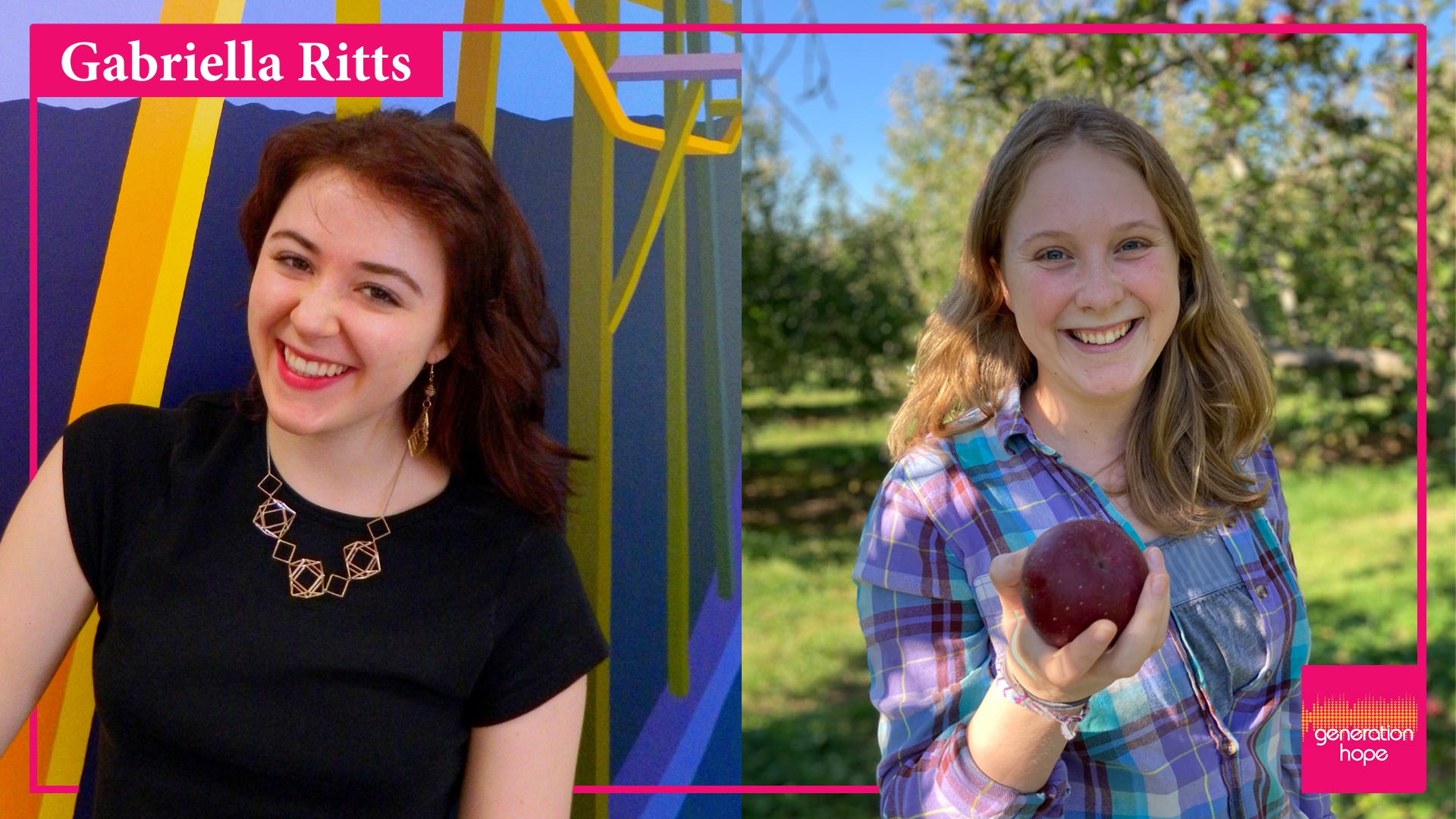
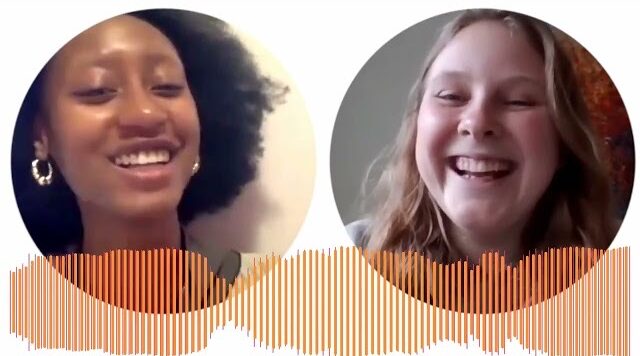
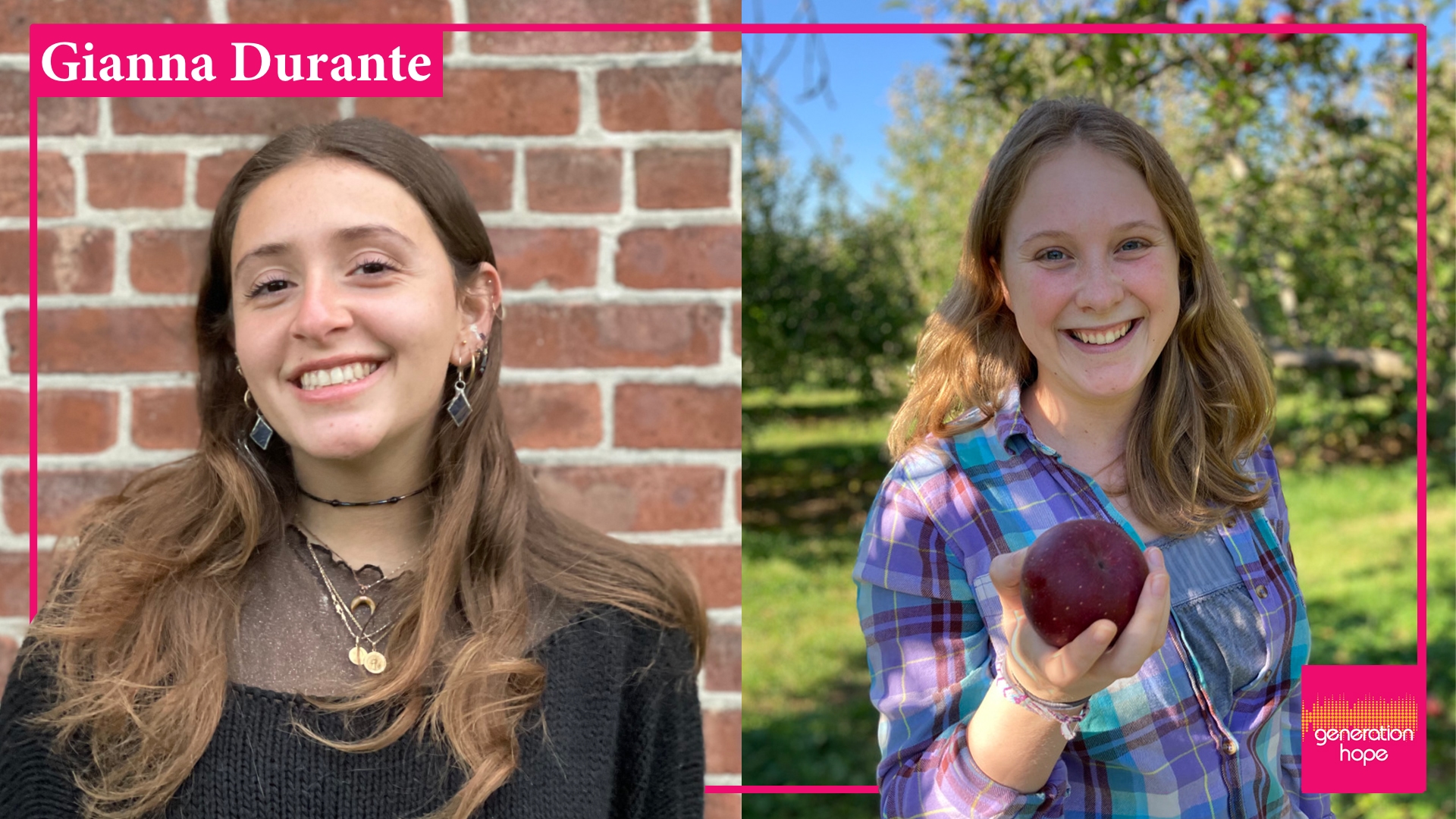
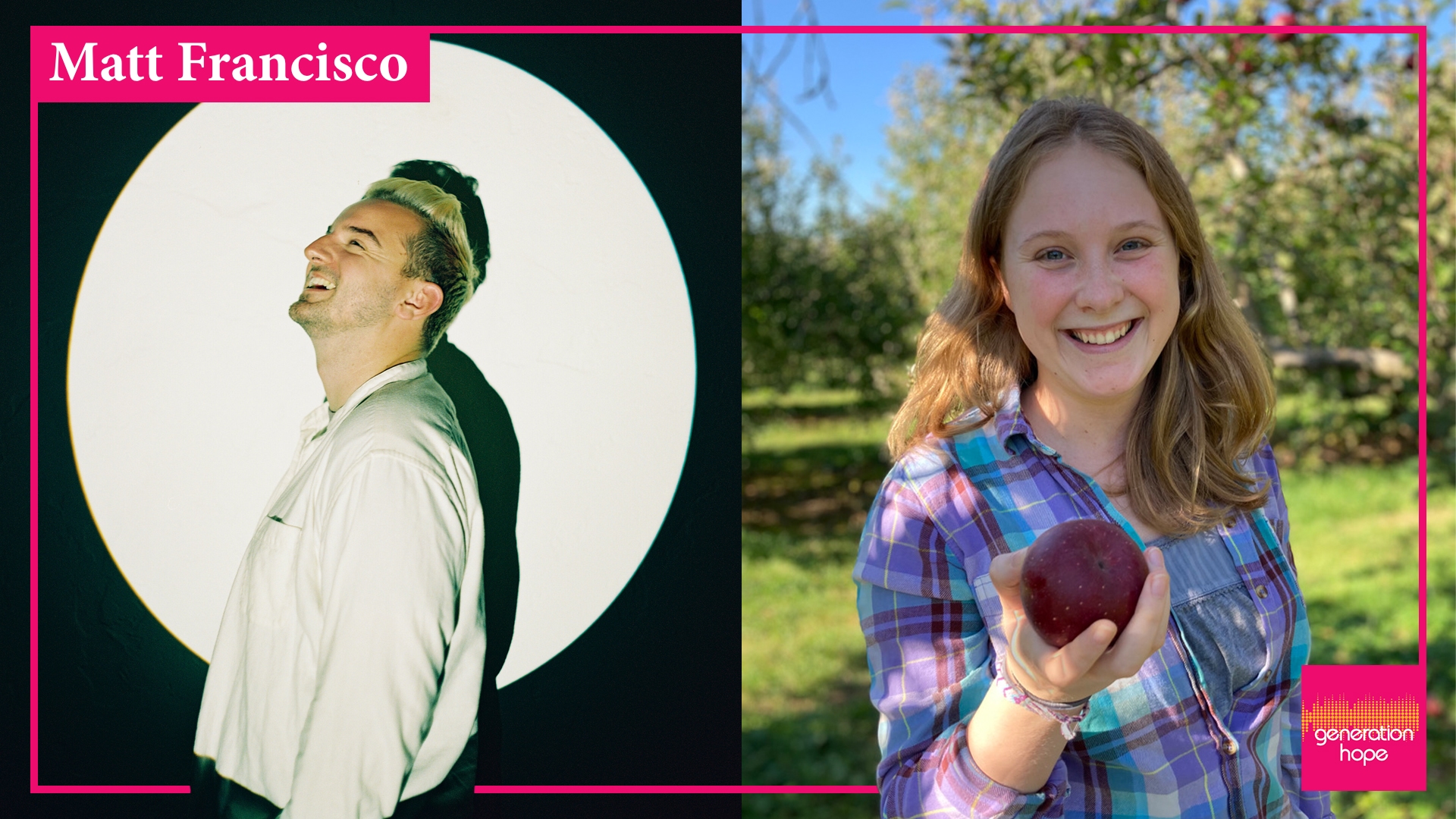
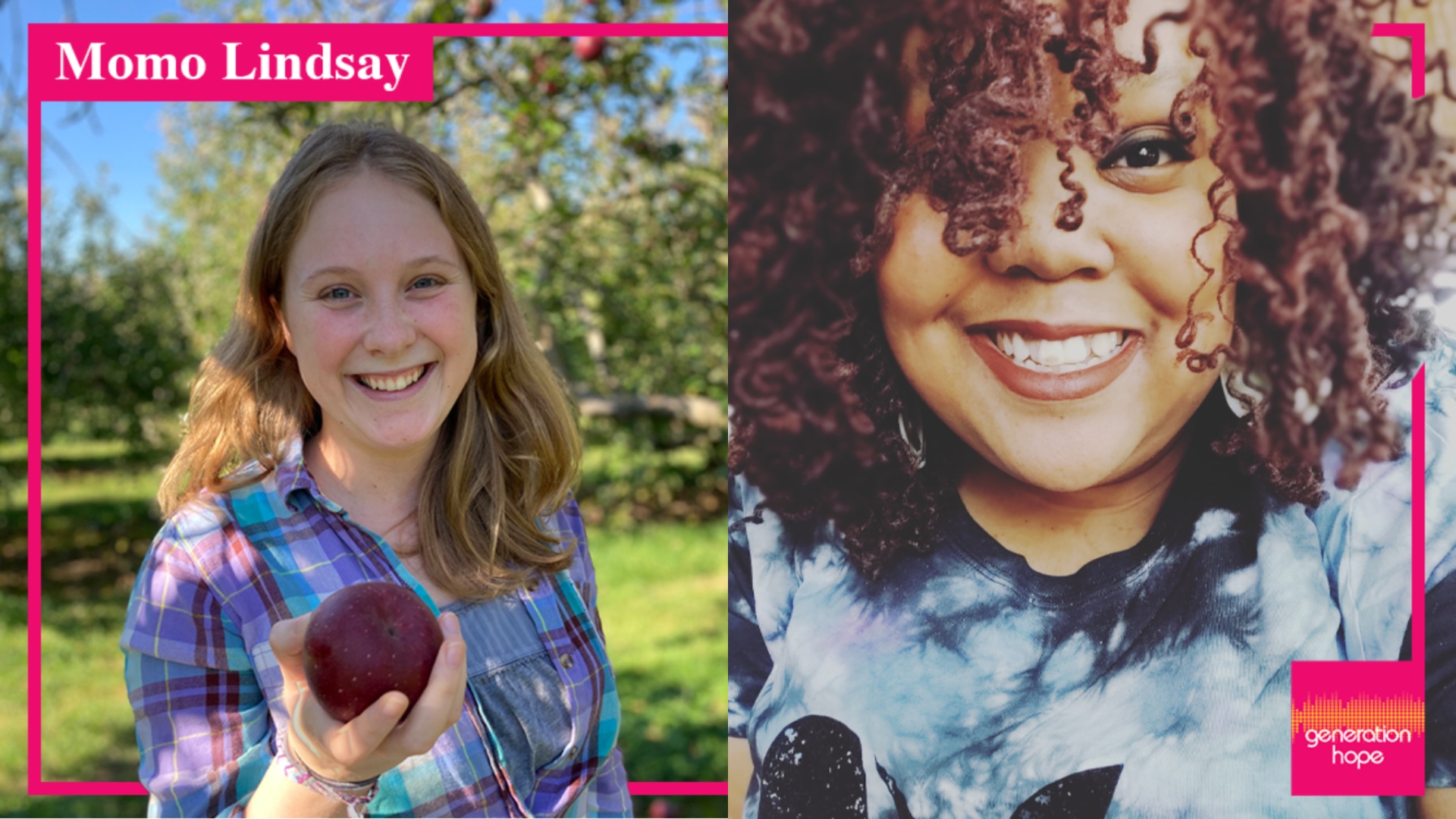

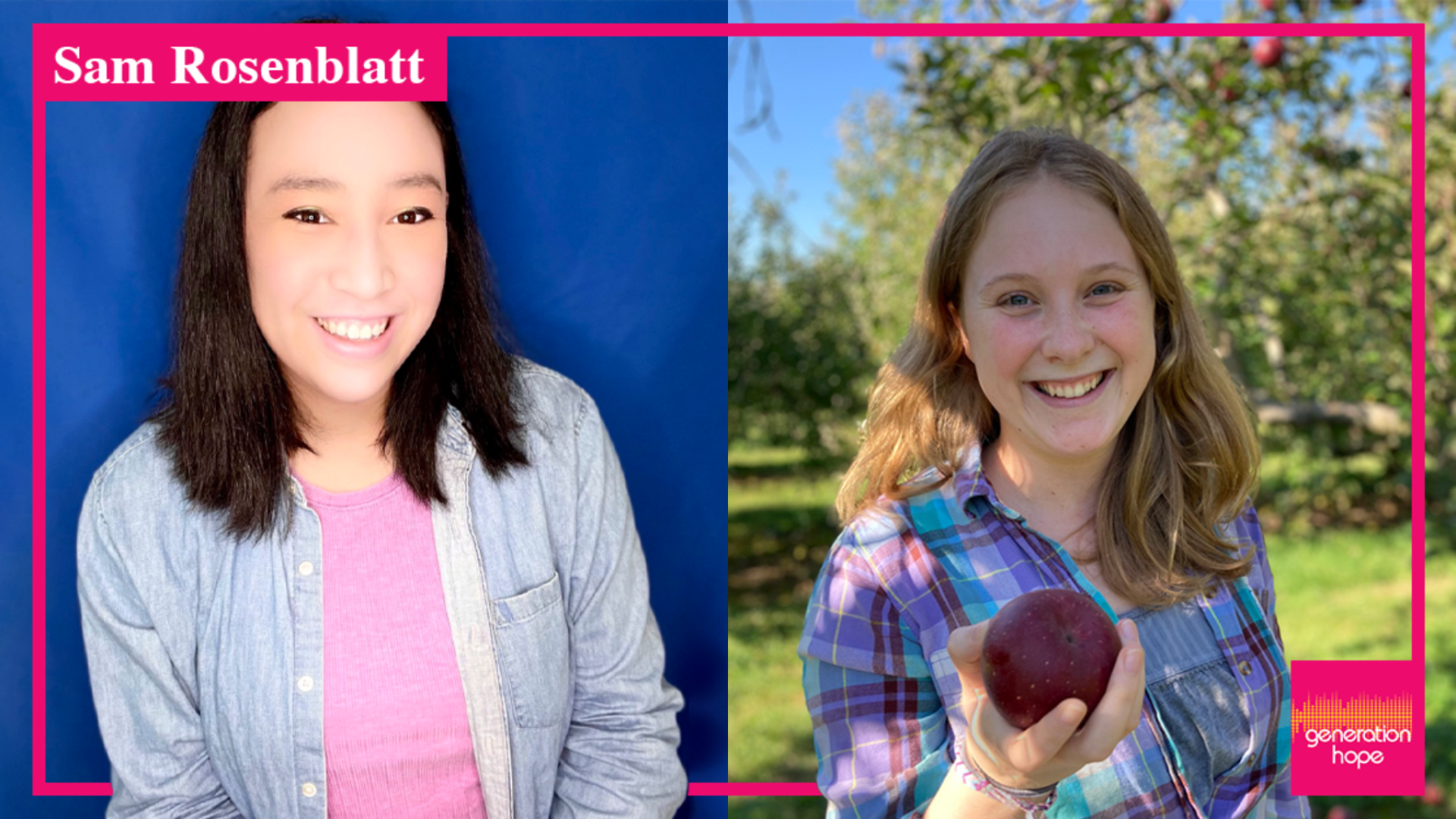
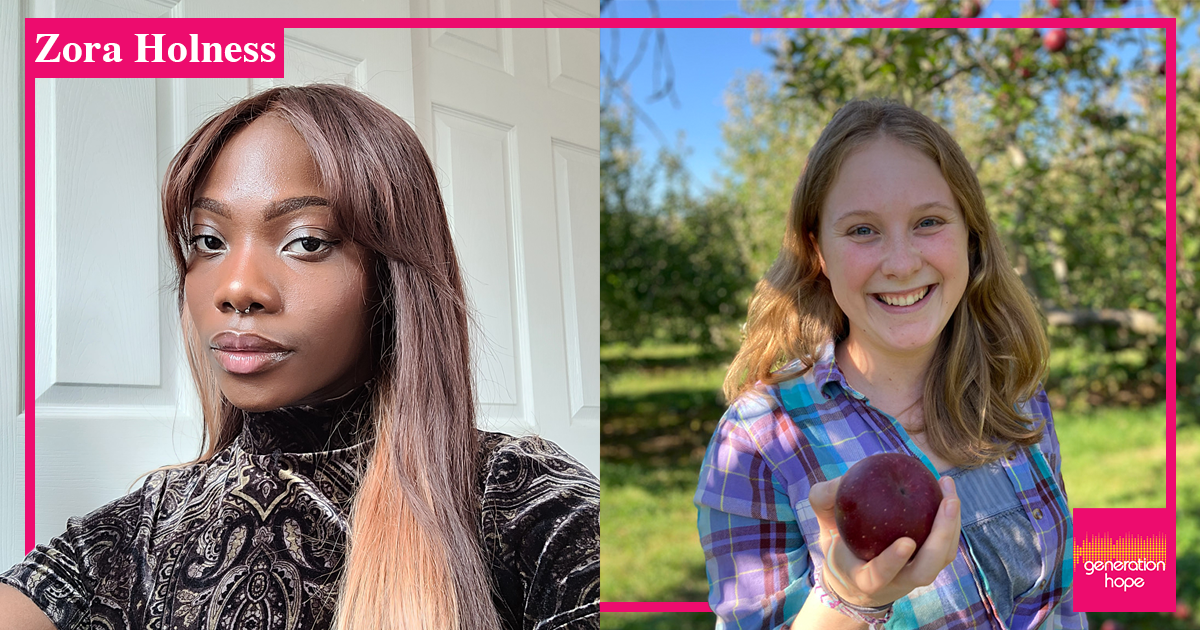
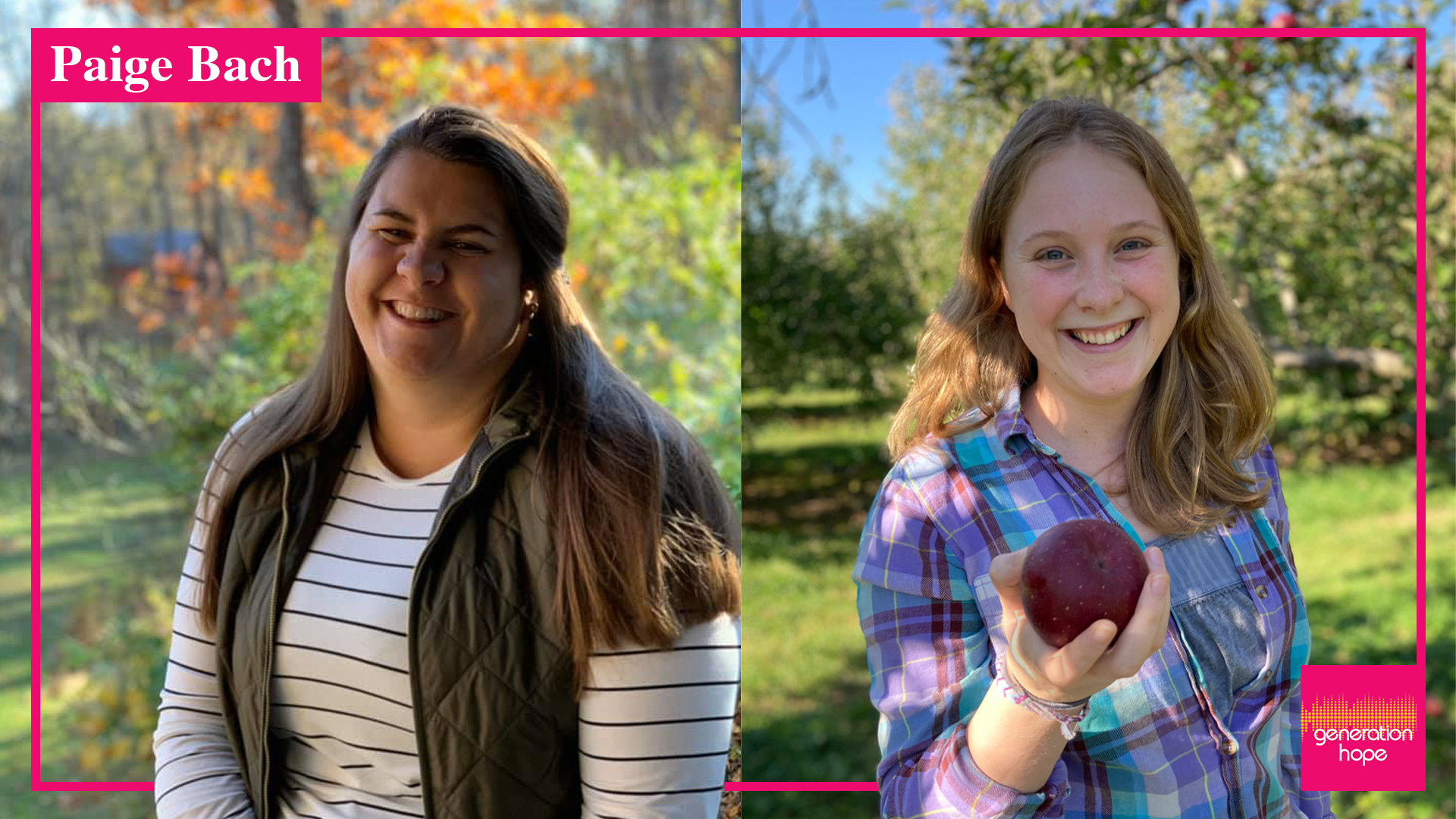
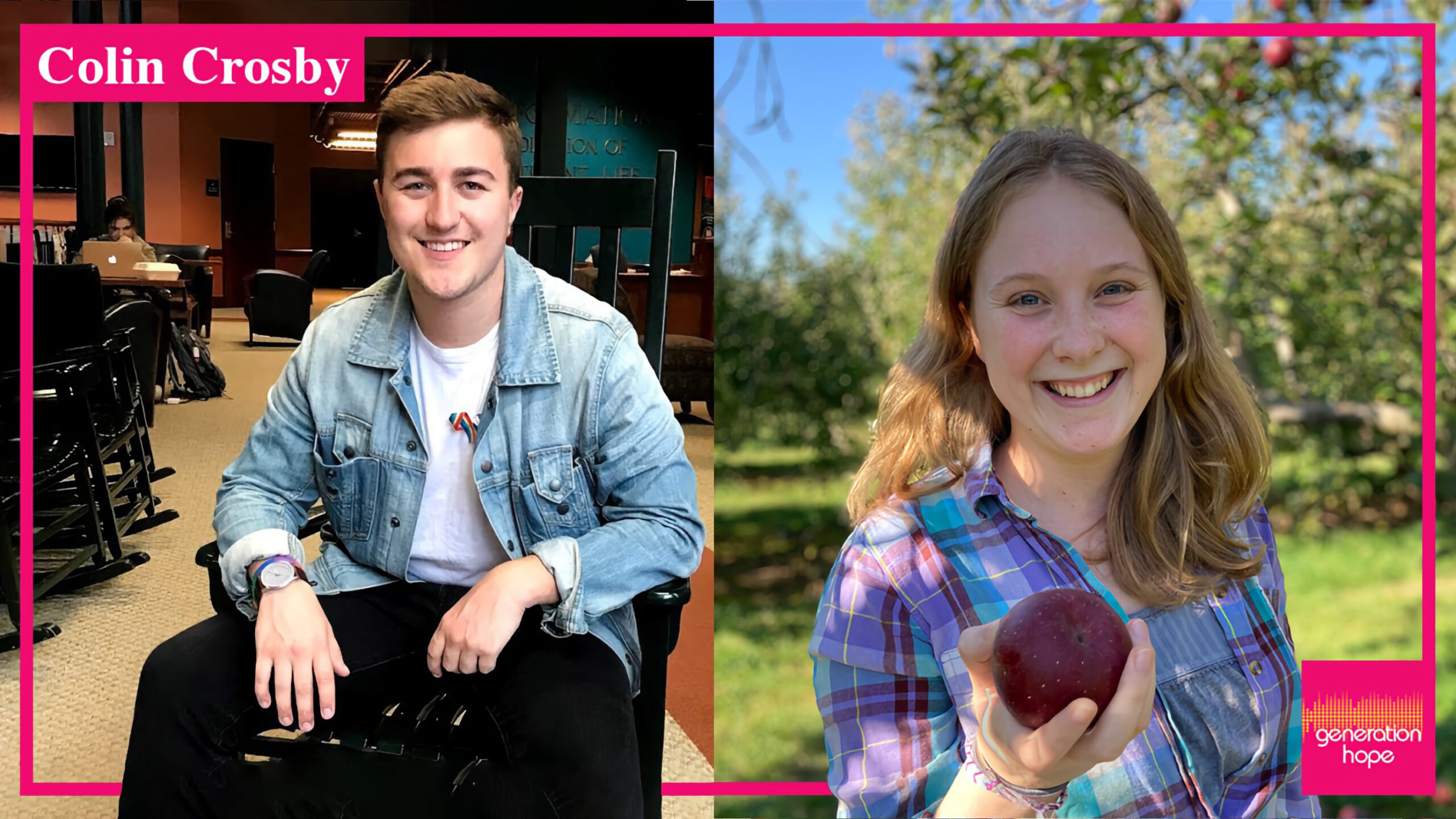
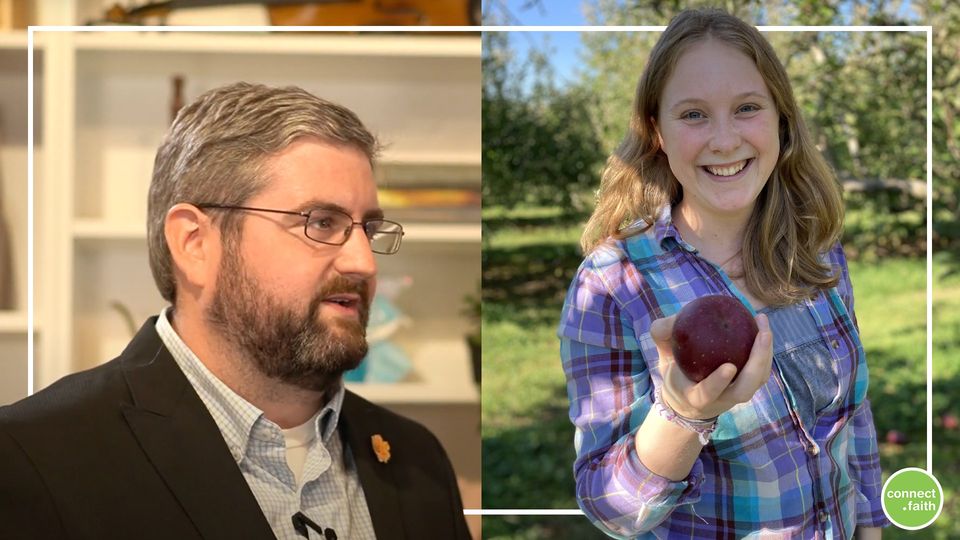
0 Comments